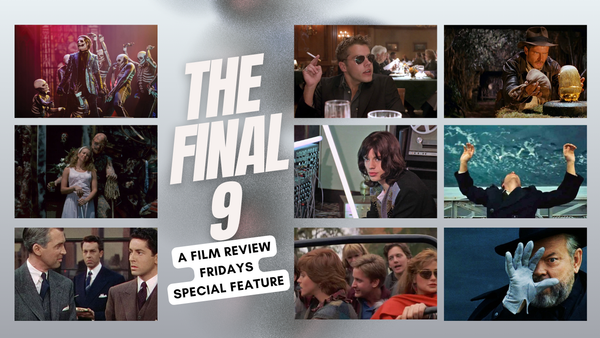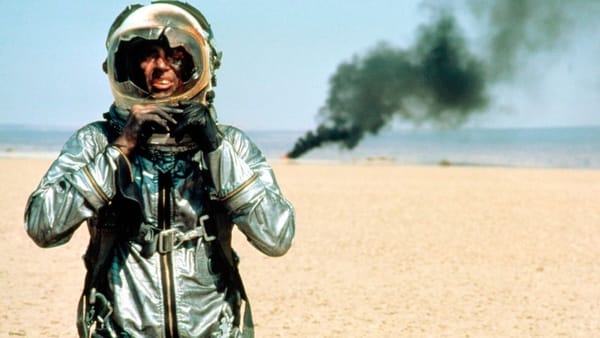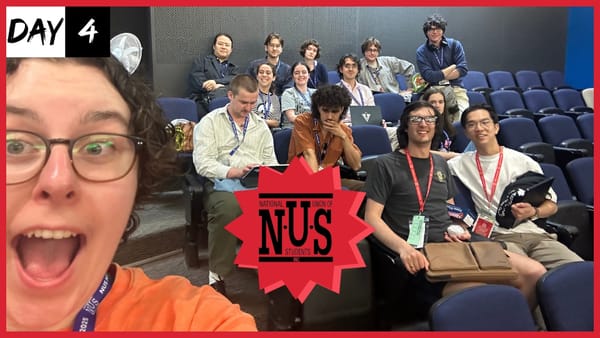“It sounds like a lot because it is a lot:” Interview with the creators of COOKED
COOKED is a brand new play about mental health, crumbling relationships, and what it means to be a young woman in modern society. Its non-linear narrative follows main character Logan as she navigates her relationships with her Mum and her best friend Jean. COOKED invites us to see ourselves in its characters, and asks us to reflect on ourselves, our lives, and our own relationships.
The show’s creators are two UOW Performance and Theatre students, Angel Duggan and Lana Page. Ahead of its opening at the Sydney Fringe Festival’s Emerging Artist Share House on Tuesday September 23rd, I spoke with Angel and Lana about the process of creating COOKED, the real-life events that led to its conception, and what it’s like to be playing at the Fringe before they’ve even finished their degree.
Asher: Angel and Lana, thanks for sitting down with me. Can you tell us a bit about yourselves?
Lana: So, my name is Lana Page.
Angel: I’m Angel Duggan.
Lana: And we are both students at UOW. We both study a Bachelor of Performance and Theatre, majoring in Acting, and we’re in our last year. We are currently in our last semester, so, very scary, but it’s really fun. It’s felt like a long three years. And we also happen to be putting on a show for this year’s Sydney Fringe Festival, and it’s on next week!
Angel: Yeah, Lana and I have been getting more into writing. The course has kind of pushed us in the direction of making our own work, which has helped us. A lot of our devising subjects and some of our production subjects have pushed us in that direction. So we’re taking what we’ve learnt and applying that, also with outside knowledge and industry knowledge. But yeah, we wrote it, we produced it, we directed it, and we’re acting in it.
Asher: A lot of hats.
Lana: A lot of hats.
Asher: And how does it feel to be putting on a show at the Fringe while you’re still at uni?
Lana: Oh my God, it’s… it’s a lot. It’s like an accumulation of steps. So now that we’re here and you look back and you go, ‘Wow, that was a lot of work,’ but because we kind of chipped away at it, it didn’t feel too overwhelming. It’s still stressful because we still have class and we had to negotiate with teachers to, like, leave early and the more admin-y things. But now that it’s a week away, we’re finding that all of our hard work is starting to come together and pay off, and we now have a show! But it is scary, definitely, to put a show on in Sydney. It’s so far. Like, just the logistics of travelling to Erskineville and we have to bump in and out really quickly. So trying to organise just to get stuff in and out and to get up there in time is a lot of work.
Angel: I think it feels quite exhilarating. It’s been a long process. We’ve been rehearsing since July, so it’s just exciting to actually see something come to fruition. And it’s been long. But rewarding, I guess, and it feels independent, and like I’m using the degree.
Asher: Do you know how long exactly you’ve been working on it?
Lana: Well, we started writing the play last year, and we didn’t even plan to put it on at Fringe, but by the time we finished, it Fringe had come around. And we were like, ‘Oh, maybe we should just put it on,’ and then we started thinking about putting it on. And then, you know, you put your initial expression of interest in. And then we just started following the steps of doing the payments and putting our marketing in, and just following all the forms. They make it really easy at Fringe. It’s very streamlined, and you just follow the steps, and it’s quite simple to follow. And then suddenly, once we’d filled out forms, paid the fees, we were on.
Angel: It’s been over a year.
Asher: Wow.
Angel: Yeah, we started it between semesters of last year.
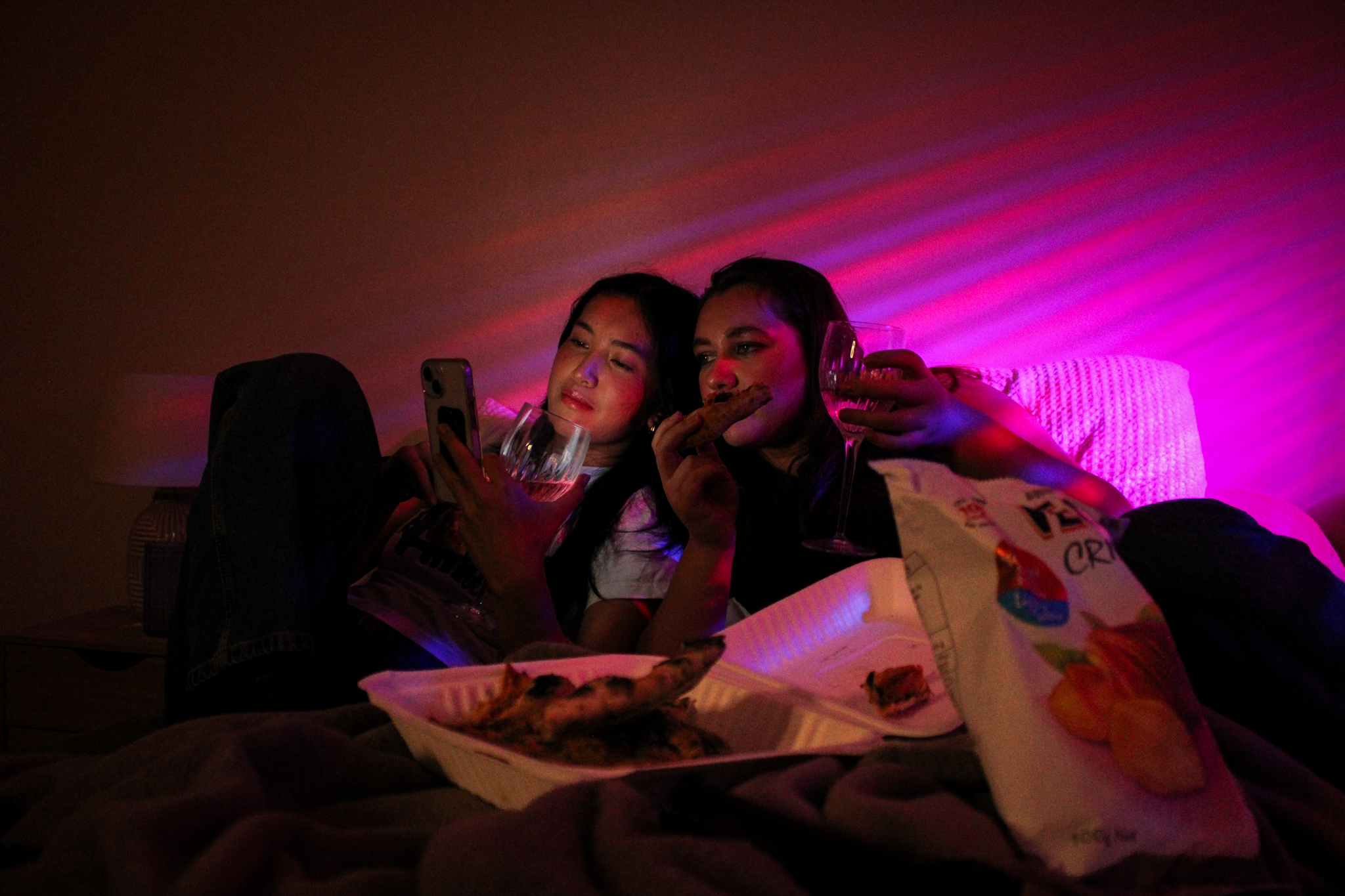
Asher: So, you’re the writers, actors, and directors. What has the process of rehearsing the show been like for you? Can you share some of your highlights?
Lana: It’s been a lot of collaboration because we are wearing a lot of – we have like, we have our team, our main team, we’ve got Angel and I and Sally [Evans] as the actors, but we also are all directing, and we’ve got Callum [Haddow] who’s doing Tech, and we’ve got Sam [Hollingshead], who is doing costume and props. What’s helped is that Callum and Sam have really taken on their roles. And so we rarely have to think about the tech stuff or the costume stuff. They kind of take that under their wing, we still help a little bit, but it’s taken those two off our heads, especially marketing as well. Sam’s really good with marketing stuff. But with us, between Sally, Angel and I we do a round robin thing where if I’m not in the scene I’m helping direct, and then if they’re not in the scene, they’re helping direct, but it’s just like taking turns.
Angel: Outside eye.
Lana: Yeah, outside eye, we get heaps of friends in, to come in and watch the play in its early developments and give us feedback or just what worked, what didn’t work, and we have taken heaps of their advice on, so definitely getting help. The more help the better, not putting all the pressure on ourselves to do all of these things. Like, it sounds like a lot because it is a lot, but we have definitely spread it out between us, the amount of roles that we do, which has helped I think.
Angel: The rehearsal process has been… yeah, it’s been fun. It’s always a laugh. Sally’s a really gorgeous human. She’s a bit older than us so she’s just taken it like a champ working with these 20 year olds. And Sam and Callum did a few readings with us initially and they loved the project. And it’s been, like, a supportive… a fun little thing where we’re all passionate about it.
Lana: Yeah, everyone loves it. Everyone’s so adamant – Sally’s so adamant that she loves the writing, she loves the work, which is so validating to us as well, and then Callum also just give us accolades of, ’I’m so excited about this,’ and everyone’s telling everyone that they’re so proud and that helps as well, because it’s new. It’s our first, it’s our writing debut and our acting debut in a Sydney context. But it can be daunting. And so, having a team that all believe in you, it’s good, it’s really nice.
Angel: Sally also went to Theatre Nepean, that discontinued acting course. So it’s been really good to get her insight when she’s directing Lana and I, and she has some really insightful suggestions about what to do with the script and some of the actions, which has been really good.
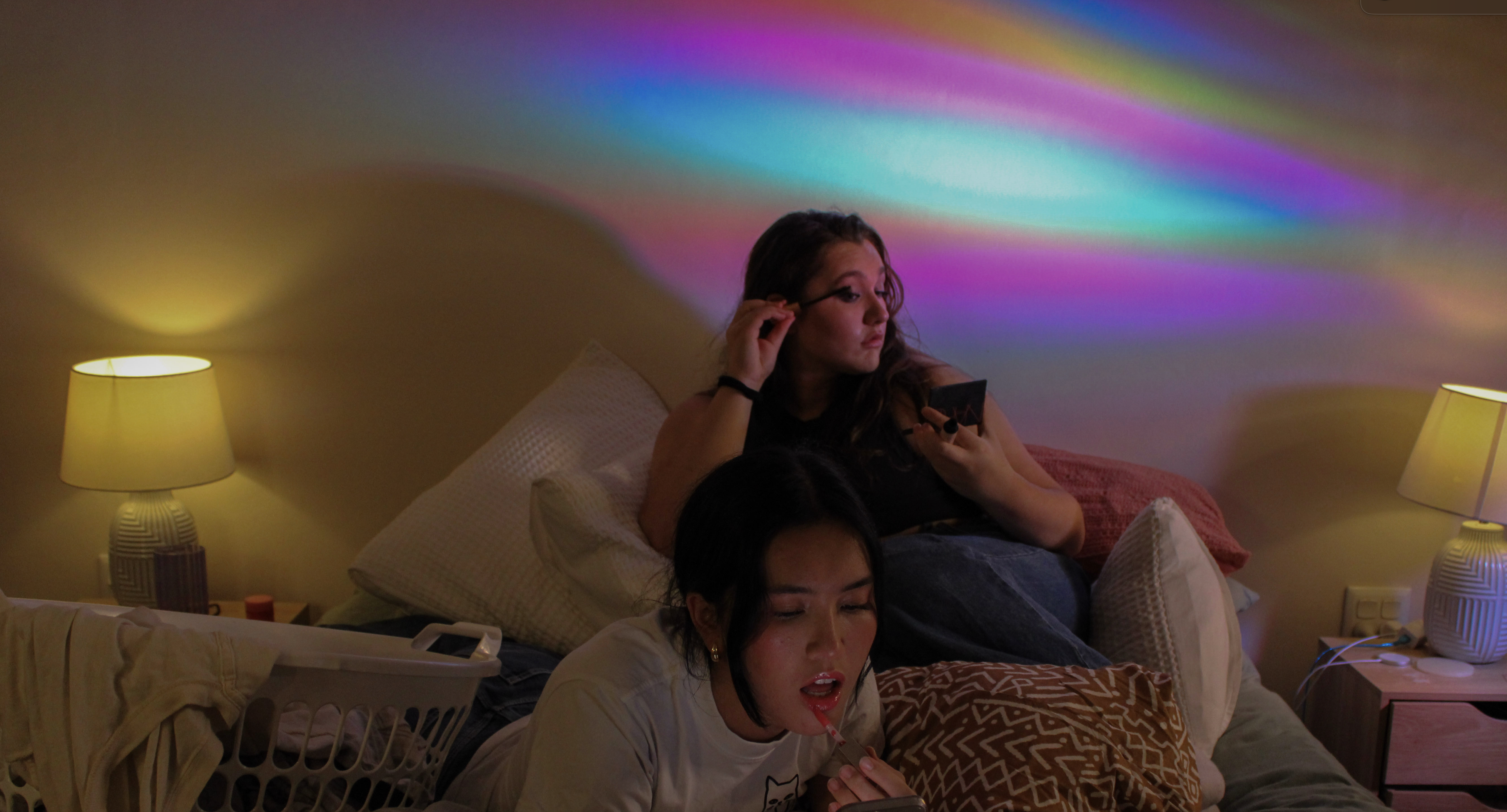
Asher: So, you deal with some pretty hard-hitting topics in the play. What inspired you or led you to that subject matter?
Lana: So the play deals with a lot of really complex relationships. When we first started writing, the play was, like, abusive toxic relationships, and relationships in general, but we started talking to each other and we were talking about our friends and their really shitty shitty boyfriends. And it was quite, you know, everyone knows someone that’s in an awful relationship. Everyone. It’s, like, universal. Most of the relationships are awful. We were just talking and ranting about it and how annoying it is to be on the sidelines and watching someone you love go through that, and then they talk to you about it, but nothing changes. So that was the inspiration for one of the characters, Jean, and one of the storylines in the play. And then it just snowballed and we started adding more depth. Then we were also talking about how it’s overwhelming to have all of these pressures, whether it’s uni work, emotional pressures, and then you have a friend that’s really demanding and you can’t – you don’t have the emotional support to give to them, and how that can be really strenuous. And we really wanted to make it a complicated journey where, you want to help this person, you want to help your friend that’s going through something, but you don’t have the capacity to help them because you yourself need help. And there’s another character, Mum, who suffers with a lot of mental health issues. But you [Angel] can speak more to that.
Angel: Yeah, so, Mum is… she struggles with depression, but we come to find out that she also abuses alcohol. We kind of started writing her… firstly, Logan needing another pressure external to Jean, but my mum suffers with chronic depression and she’s on and off medications, trialing different psychotropic meds, all the time. So, we found that to be quite a complex hellscape. And, um, just blindly trusting doctors. We also looked into the over-prescription of medication and how it’s really easy, especially for women, to get antidepressants. It was really easy for me to get antidepressants during COVID. It was one 5-minute phone call, for example. So Mum is kind of a product of that. And also her and Logan’s closeness and how that deteriorates, and just putting all that pressure on the one character really helped to build the dramaturgy as well and, like, have some of the abstract stuff that we did put in as well. But yeah, Mum really suffers.
Lana: So yeah, Logan’s in the middle, Jean’s over here, giving her emotional pressure in this direction, and then Mum’s over here, giving a lot of emotional distress that way, and then you have this character in the middle and in the play we get to a breaking point, and then what happens after that. And so the play kind of explores that as well of, what can you do when you can’t do anything, and it’s just too overwhelming, what happens?
Angel: Forfeit. Hang up. Surrender.
Lana: Yeah.
Angel: But my mum’s definitely an inspiration, and some of our friends that have gone through these relationships, although we don’t directly reference them. And we’ve interviewed them and asked for their permission.
Asher: What do you hope audiences will take away from the show?
Lana: I think that each audience member will resonate with a character at a certain moment in time, and they’ll definitely see themselves in the characters and say, ‘I’ve been that friend,’ or ‘I’ve seen that.’ ‘I know someone right now. They’re sitting next to me.’ Like, I think there’ll be a lot of familiarity with audiences and they’ll be able to resonate with different characters at different moments. And I think because they latch on to someone early on, when they see the progression of that character, they can see themselves maybe being pushed to the extreme and different scenarios of what can happen. And having empathy, and gaining perspective on different characters.
Angel: Moral ambiguity.
Lana: Yeah, there’s a bit more moral ambiguity to characters, and it’s less black and white. There’s more nuance, and there’s definitely a time where all the characters are “in the wrong” at some point.
Angel: I think it’s funny. And sad. It’s non-linear, so each scene is kind of a stand-alone feeling. Each scene kind of stands for itself in what it will give to the audience. But yeah, there’s some funny stuff. There’s some sad stuff. I do think that the audience will come away with a sense of hope, but maybe a little bit of sorrow. Some sadness.
Lana: Yeah, because I don’t think we give a solution.
Angel: No.
Lana: We just kind of, show…
Angel: Yeah, I guess each scene is kind of like a little mini instalment of this person’s life. But… we hope they like it.
Lana: I think it’ll give lots of reflection. That’s the main thing. Reflection on their own lives and people that they have in their lives that are similar to these characters.
Asher: Is there anything you want to add before we wrap up?
Angel: You should come see us!
Lana: Please come and see the show. It’s fun. It’s sad. It’s been a long time coming so we’re excited to finally put it on and show people.
Angel: Um, we have a few trigger warnings. There’s a lot. [Content warnings are available at the link below.]
Lana: But don’t let that deter you! Please, please, please. But yeah, it’s been fun. And thank you to the Tert for interviewing us.
COOKED will be playing at Erskineville Town Hall from September 23rd to 27th as part of the Sydney Fringe Festival’s Emerging Artist Share House. You can find more information and grab your tickets at this link.

